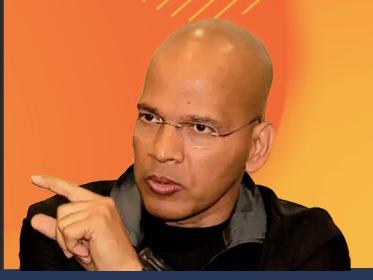Only way to lift India’s poor out of backwardness is to make good quality education accessible: IPS Basant Rath in exclusive chat with TwoCircles.net

By Maariyah Siddique, TwoCircles.net
Hailing from the eastern Indian state of Odisha, Basant Kumar Rath is the 2000-batch IPS officer who gained immense popularity and respect during his stint as the IGP (Traffic) in Jammu & Kashmir. An alumnus of Jawaharlal Nehru University (JNU) in New Delhi, Basant Rath has an appealing straightforward style as a netizen who regularly interacts with his followers on social networking sites like Facebook and microblogging site Twitter.
Although surrounded by controversies, Basant has a unique style of addressing traffic rules violators, giving no preference to recommendations over duty. Over the years since his promotion, he has been known to have maintained a professional dauntlessness in implementing traffic rules in the Valley. He is constantly praised for winning the hearts of the people in Jammu & Kashmir, especially for his ‘Free Book Initiative.’
In a casual chat with TwoCircles.net, Basant shares heartfelt stories about his childhood, parents and his book initiative.
TCN: A top cop while in service starting a ‘Free Book Initiative’ at such a scale is usually unheard of in India. What led you to start your book initiative in Jammu & Kashmir and when?
Basant: I come from a village and we were dirt poor. My mother used to starve, pretending that she fasted for religious reasons. I saw a library for the first time when I was 16, that too from outside. I saw the inside of a library when I was in my second year of graduation in Bhubaneswar.
My parents didn’t go beyond the second standard and they made me realize the importance of great books and good education. I come from an Odia medium school and I used to stammer.
Rabi Mohanty taught me Sociology in graduation and he encouraged us to go to JNU. In JNU, I realized the only way to lift India’s poor out of deprivation and backwardness is to make good quality education free and accessible to them.
My book distribution initiative started in Poonch in 2001 when I was doing my probation. It was unsystematic and disorganized, to begin with. It became structured and organized in 2006 in Ramban. I started using social media to reach out to the deserving students in J&K and Ladakh in 2016 when I was looking after Doda, Kishtwar and Ramban.
TCN: How has your childhood and upbringing helped shape this initiative?
Basant: Bou (Mom in Odia) wanted us to respect books and take our education seriously. Nana (Dad in Odia) was very particular about how we kids used our mornings. These things stayed with us.
TCN: Do you have a rough idea of how many students have been provided with books till now? Is there any special requirement for students to request books?
Basant: No. I don’t keep a track of the numbers. But I’m extremely proud of what I’ve done in the last five years. I usually speak with the students and get a hang of what they want.
TCN: Did communication ban post abrogation of Article 370 affect the number of requests you receive and the distribution of books as well?
Basant: It hasn’t affected my reach and delivery network.
TCN: You have earned a lot of respect in Kashmir where the uniform represents something very harsh. Do you agree? Has this affected your job or relations with the bureaucracy as an officer?
Basant: “Be a good human being, don’t be a typical Babu,” Bou said. Being a student of Sociology and Psychology, I always had a healthy disrespect for bureaucracy, right from the beginning. As a matter of first principles, I have a very low opinion about India’s bureaucrats and this is purely my personal opinion.
My popularity is a strength, not a weakness. I can go and play cricket with the school kids in Gool, Gojwara and Sopore. I love that about my life.
Right from my probation days, I made a conscious decision to stay away from the IAS-IPS biradari. I’m glad that I made that choice. What they think of me is as important for me as the ‘k’ in knife.
TCN: During your time in Kashmir, what has been your biggest challenge on duty?
Basant: I love working in Jammu & Kashmir. I haven’t gone on deputation even once in the last 20 years. I’ll be extremely unhappy if I’m forced to go work in a different place.
